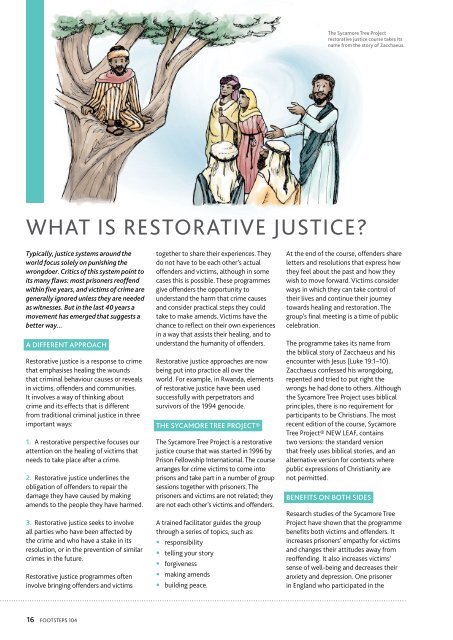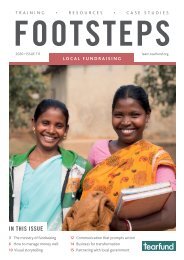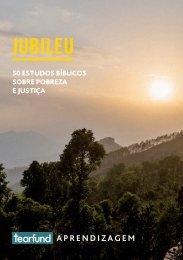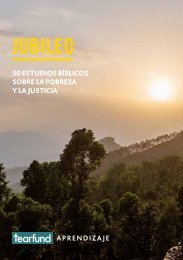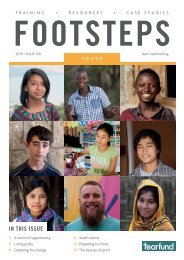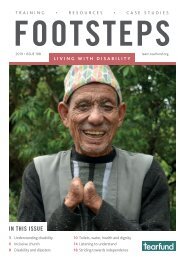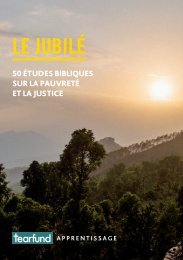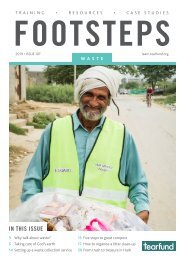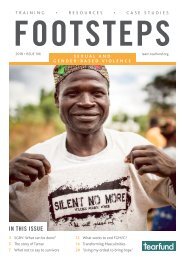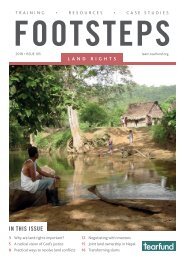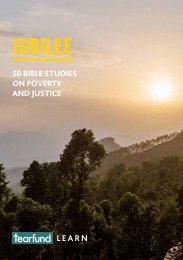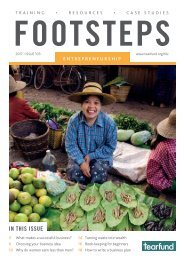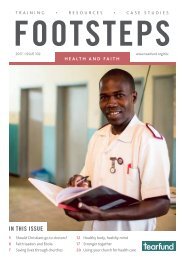Footsteps 104: Prisons
Footsteps 104 features practical tips for getting involved in prison ministry and caring for ex-offenders.
Footsteps 104 features practical tips for getting involved in prison ministry and caring for ex-offenders.
You also want an ePaper? Increase the reach of your titles
YUMPU automatically turns print PDFs into web optimized ePapers that Google loves.
The Sycamore Tree Project<br />
restorative justice course takes its<br />
name from the story of Zacchaeus.<br />
WHAT IS RESTORATIVE JUSTICE?<br />
Typically, justice systems around the<br />
world focus solely on punishing the<br />
wrongdoer. Critics of this system point to<br />
its many flaws: most prisoners reoffend<br />
within five years, and victims of crime are<br />
generally ignored unless they are needed<br />
as witnesses. But in the last 40 years a<br />
movement has emerged that suggests a<br />
better way...<br />
A DIFFERENT APPROACH<br />
Restorative justice is a response to crime<br />
that emphasises healing the wounds<br />
that criminal behaviour causes or reveals<br />
in victims, offenders and communities.<br />
It involves a way of thinking about<br />
crime and its effects that is different<br />
from traditional criminal justice in three<br />
important ways:<br />
1. A restorative perspective focuses our<br />
attention on the healing of victims that<br />
needs to take place after a crime.<br />
2. Restorative justice underlines the<br />
obligation of offenders to repair the<br />
damage they have caused by making<br />
amends to the people they have harmed.<br />
3. Restorative justice seeks to involve<br />
all parties who have been affected by<br />
the crime and who have a stake in its<br />
resolution, or in the prevention of similar<br />
crimes in the future.<br />
Restorative justice programmes often<br />
involve bringing offenders and victims<br />
together to share their experiences. They<br />
do not have to be each other’s actual<br />
offenders and victims, although in some<br />
cases this is possible. These programmes<br />
give offenders the opportunity to<br />
understand the harm that crime causes<br />
and consider practical steps they could<br />
take to make amends. Victims have the<br />
chance to reflect on their own experiences<br />
in a way that assists their healing, and to<br />
understand the humanity of offenders.<br />
Restorative justice approaches are now<br />
being put into practice all over the<br />
world. For example, in Rwanda, elements<br />
of restorative justice have been used<br />
successfully with perpetrators and<br />
survivors of the 1994 genocide.<br />
THE SYCAMORE TREE PROJECT®<br />
The Sycamore Tree Project is a restorative<br />
justice course that was started in 1996 by<br />
Prison Fellowship International. The course<br />
arranges for crime victims to come into<br />
prisons and take part in a number of group<br />
sessions together with prisoners. The<br />
prisoners and victims are not related; they<br />
are not each other’s victims and offenders.<br />
A trained facilitator guides the group<br />
through a series of topics, such as:<br />
••<br />
responsibility<br />
••<br />
telling your story<br />
••<br />
forgiveness<br />
••<br />
making amends<br />
••<br />
building peace.<br />
At the end of the course, offenders share<br />
letters and resolutions that express how<br />
they feel about the past and how they<br />
wish to move forward. Victims consider<br />
ways in which they can take control of<br />
their lives and continue their journey<br />
towards healing and restoration. The<br />
group’s final meeting is a time of public<br />
celebration.<br />
The programme takes its name from<br />
the biblical story of Zacchaeus and his<br />
encounter with Jesus (Luke 19:1–10).<br />
Zacchaeus confessed his wrongdoing,<br />
repented and tried to put right the<br />
wrongs he had done to others. Although<br />
the Sycamore Tree Project uses biblical<br />
principles, there is no requirement for<br />
participants to be Christians. The most<br />
recent edition of the course, Sycamore<br />
Tree Project® NEW LEAF, contains<br />
two versions: the standard version<br />
that freely uses biblical stories, and an<br />
alternative version for contexts where<br />
public expressions of Christianity are<br />
not permitted.<br />
BENEFITS ON BOTH SIDES<br />
Research studies of the Sycamore Tree<br />
Project have shown that the programme<br />
benefits both victims and offenders. It<br />
increases prisoners’ empathy for victims<br />
and changes their attitudes away from<br />
reoffending. It also increases victims’<br />
sense of well‐being and decreases their<br />
anxiety and depression. One prisoner<br />
in England who participated in the<br />
16 FOOTSTEPS <strong>104</strong>


